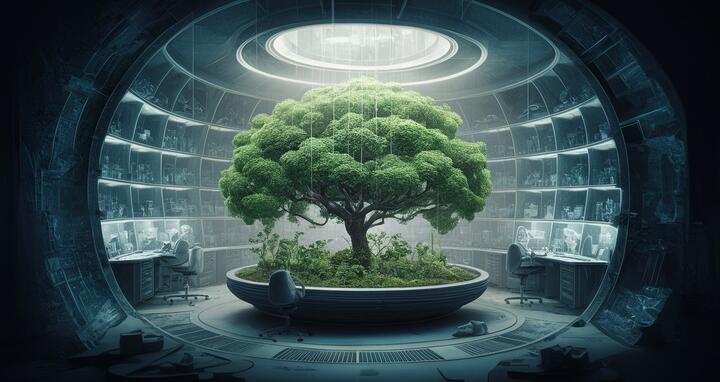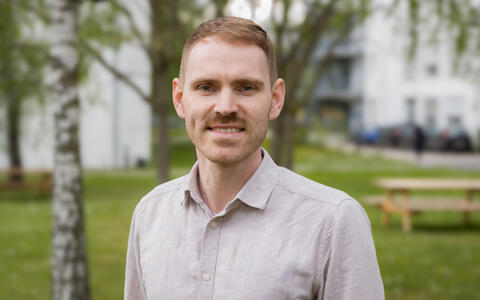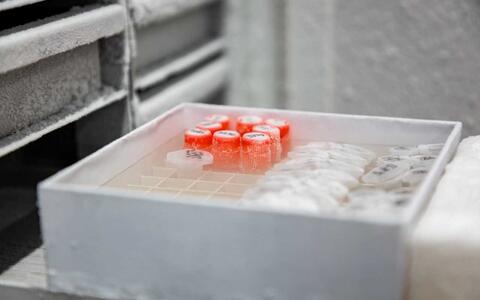Greening the Lab: Together for Sustainability
Life science research requires a lot of energy. Samples are stored at temperatures well below freezing, the air inside laboratories must be constantly replaced, and mountains of data, from imaging for example, require enormous storage capacities. At the same time materials, energy, and personnel are becoming increasingly scarce and expensive.
"As a publicly funded research institution, we serve as a role model. It would be a contradiction to want to improve the world and at the same time harm it," says Christian Panetzky, since April 2024 the new Sustainability Coordinator at the Max Delbrück Center. According to the current CO2 balance, the center produces about 20,000 tons of CO2 equivalents each year. This means that merely by working at the Max Delbrück Center, one is effectively doubling their CO2 footprint.
The goal is to become greenhouse gas neutral by 2038. Panetzky's predecessor, Dr. Michael Hinz, launched a corresponding sustainability concept for the Max Delbrück Center in 2020.
Labs must become more energy-efficient
The Max Delbrück Center has since switched to certified green electricity, and the labs are gradually being retrofitted to operate as energy-efficiently as possible. "This is the biggest lever. Laboratory buildings consume three to ten times as much energy as ordinary office buildings," says Panetzky. This is mainly due to laboratory air exchange, which accounts for up to 80 percent of the total energy consumption by the labs at the Max Delbrück Center. Air exchange is essential for safety reasons but can be regulated more flexibly, saving energy.
In his last position, Christian Panetzky has primarily been involved with sustainability in research funding. After studying European Studies, he worked as an advisor to the president at the Helmholtz Association head office, organizing a research campaign on sustainable value chains, among other things. He is now looking forward to dedicating himself to his own projects for sustainable, future-proof research. Competition for skilled workers is increasing, and budgets are shrinking. Sustainability is a lever for remaining competitive, attracting young people as an employer, and demonstrating social responsibility.
Wanted: ideas from the community
High on his agenda is the sustainability report, which will be a mandatory component of annual reporting starting in 2025. "Legislators want to ensure that more investment flows into sustainable projects. The report can be used to demonstrate clearly and measurably where we stand. From there, we can build on this with specific measures," he says. "I’m hoping for a lot of good ideas from our community, and I want to support the researchers," he says. He knows that his colleagues in the labs know best what works and what doesn’t. Quantifiability is key: you have to ask yourself how much good it does to save plastic tubes in the lab and separate waste when you get on a plane for the next conference. Panetzky wants to make transparent which measures bring how much benefit. A good basis is provided by the LEAF program for more sustainability in the lab, developed at University College London, which can help make research processes more resource-efficient and save money and CO2 along the way. He would like to build on earlier initiatives at the Max Delbrück Center and hopes that many groups will have their labs certified.
Panetzky also wants to continue tried-and-tested concepts such as the “Freezer Challenge”. The challenge aims to motivate researchers to use cooling devices for samples more energy-efficiently by raising the temperature slightly to -70 degrees Celsius and cleaning the devices. A similar idea based on this concept is in development: the "Data Clean-up Challenge." Data that is no longer in use can be identified and deleted on the servers. The keyword here is "gamification;" whoever cleans up the largest amount of data receives a prize.
It would also be motivating if teams could benefit from the savings by using some of it themselves. The portion that goes back to the central budget could also be invested in furthering sustainable development at the Max Delbrück Center. "We can only become sustainable together. And if we work together on worthwhile solutions for everyone, this strengthens our community," says Christian Panetzky.
Text: Wiebke Peters
Further information
- Designing climate-friendly research infrastructures
- "No one can achieve sustainability alone"
- Sustainable Development at the Max Delbrück Center
- About the AI generated image
-
Prompt: Metaphorical visualization of a greenlab, which is a highly sustainable research laboratory.
© Created with https://ideogram.ai







